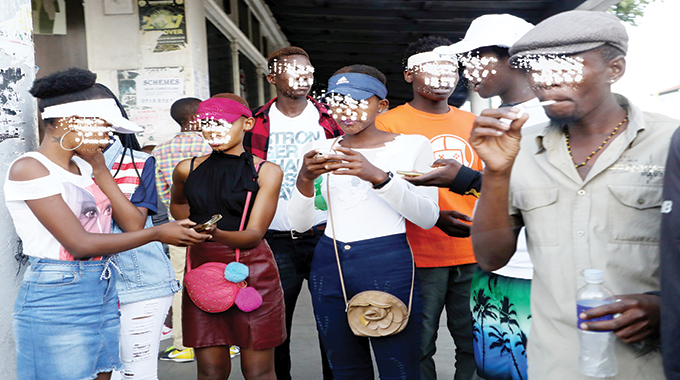Men taking responsibility of menstrual health management: Strides towards better access to SRHR in Zimbabwe

Andile Tshuma
The international conference on reproductive health of March 1998 saw Zimbabwe become a signatory to the 1998 Convention on the Elimination of all forms of Discrimination Against Women, with a specific focus on the rights to sexual and reproductive health.
Article 16 of the convention guarantees the right to decide on the number and spacing of children while article 14 speaks to issues on women accessing all forms of sexual reproductive health facilities, regardless of social standing or geographical location.
Despite the well-meaning legal frameworks and policies put in place, women still face challenges in access to sexual reproductive health rights in Zimbabwe and the rise in the cost of sanitary wear is one of the most burdensome challenges affecting women, with the cheapest pack of sanitary towels going for about $9, up from $0,80 recently.
Many groups in society have called for the availing of free sanitary wear for women. However, it is still yet to happen although government is making efforts towards the cause, the latest being scrapping import duty for sanitary wear imports.
The situation has driven some men in Zimbabwe to start fundraising for sanitary pads to help schoolgirls who have to miss some days of school when they are on their periods as they cannot afford to buy sanitary wear.
Some pupils from Mahlothova Primary School in Umguza District recently said they sometimes missed up to six days of school a month when they were on their periods as pads were too expensive to buy.
Mr Cosmas Zulu, a seasoned football coach, founded the Sanitary Pads Movement which has been operational for the past five years and seeks to ensure that girls do not miss school because of periods.
Cultural norms around menstruation are rooted in gender inequality and compromises women’s ability to manage menstruation hygienically and with dignity.
While there has been significant progress in making communities understand menstrual hygiene and do away with oppressive norms, the role of men in supporting menstrual hygiene has been lacking as menstruation is still considered a taboo in many cultures.
The role of men in reproductive health has been acknowledged. However, many men remain ignorant of the normal physiology of menstruation such as the menstrual cycle and the hygienic measures that should be taken during menstruation, even though they are often responsible for decision making regarding health facilities and services needed by women and girls.
Men can be supportive in multiple domains when women are going through menstruation, which can sometimes be uncomfortable or painful in the household, community or workplace set up.
Addressing strategic issues regarding menstruation and menstrual health should include men in order to bring about significant effective and positive change in their attitudes and behaviour towards menstruation. Most men who spoke to the Press were ignorant of their spouses’ menstrual cycles and a few knew the phase of the menstrual cycle in which a woman is fertile enough to conceive, suggesting that men are not likely to manage their sexuality in a way that compliments women’s efforts to prevent unwanted pregnancies.
Most of the men interviewed said they did not include sanitary ware in their budgets for the household as they felt that the women would include it when buying other toiletries.
“I buy sanitary pads for my children. My daughters are at boarding school and the younger one is in Grade Seven but has already had a debut menstrual cycle. I buy for all of them and I send the pads to them. They’re my children as much as they are their mother’s daughters. It’s my duty as the father to ensure that their reproductive health rights are provided for. They’re also free to let me know whenever they need pain killers to relive menstrual cramps or period pains and I ensure that they have all the necessary things and care that they need to go through that time,” said Mr Bongani Mhlanga, a teacher at a local high school.
Some men, however, still feel that the subject is taboo.
“I give their mother the money because in my culture I can’t freely talk to women, let alone my own daughter about menstruation. As a father, there must be a distance between me and the girl children so that they respect my position in the family so talking about periods and pads is out of the question but I give their mother the money,” said Mr Anthony Moyo.
“I buy sanitary wear for my girlfriend who is a college student. We’re very free about it and I know the brands that she prefers and the ones that she doesn’t buy. I’m just not comfortable buying sanitary wear for her in the company of my friends because they make fun of me when I do it,” said Mr Thandolwenkosi Dube, an attorney.
Mr Zulu said he was not taken seriously when he first started the campaign to ensure that men were involved and took responsibility of sexual reproductive health for the women in their lives.
“Some of these things happen not because men are not interested but just because we’ve been socialised in that way. We were taught that certain things are a taboo so if nobody comes and tells us that there’s no such thing and we all need to change the way we perceive certain things, certain myths and beliefs will be passed down from generation to generation.
“I believe that there’s a lot that we can do as men for our communities and the women in our lives. Sexual reproductive health and menstrual hygiene shouldn’t be synonymous with womanhood and femininity. There’s a lot that we can do to ensure that the structures in our society are fully supportive of women and that their reproductive health is well provided for,” said Mr Zulu.
“Giving pads as a man does not solve the issue, it empowers the girl child and allows her to go about her chores without worrying about where to get money to buy sanitary wear, but the most important thing is changing society’s attitude about menstrual health and the role that men must play in sexual reproductive health. I discuss sexual reproductive issues with my daughters and nieces and my responsibility goes beyond just buying sanitary wear. I tell them about their health, about why they should take good care of themselves and why they should refrain from sexual activity until there are old enough to make wiser decisions about their lives.
I tell them that because I’m a man and I’ve been a youth before. I tell them these things because our society has changed so much such that aunts no longer play that important role of being the confidante and advisors to our children so all the counsel must come from the parents. I don’t leave it all to my wife. It’s a collective responsibility,” he said.
“I find the relationship I have with my daughters very fulfilling. The parenting type I chose differs from the experiences of my own upbringing, I want to establish a deeper relationship with my daughters and I’ve discovered that we get along very well, just as my wife gets along very well with my son. I want to be her first love and I want to set a standard for her for what she should expect from a man who may be her future life partner.
“I want her to know that she’s beautiful, loved and full of potential to realise her dreams so that she’s empowered to make the right decisions about her life even when she has to face the world in my absence,” said Mr Alfred Dube from Kumalo suburb.
Mr Zulu said he is currently engaging the Bulawayo City Council, lobbying them to provide free sanitary wear for vulnerable girls at council schools.
“I have approached the city fathers and suggested that every council employee could contribute just $0, 10 each month which would go towards providing sanitary wear for council schools. Council employs about 7 000 people, so it means that each month, about 700 would go towards sanitary wear, which is not much but definitely something.”
“We commend government for lifting duty on sanitary wear imports and hope that more steps will be taken to ensure that no girl or woman fails to access sanitary wear during her period.
It bothers me why we find condoms all over yet sex is a choice, but menstruation is just nature. It’s a process that has to happen for procreation to take place and I don’t see reason why it must be a woman’s responsibility alone. The same way we ensure that there’re condoms available in almost all public toilets, sanitary pads must also be available,” he said.
Bulawayo provincial education director, Mrs Olicah Kaira, said government schools were making efforts to ensure that sanitary wear is availed at schools for vulnerable girls following reports of a trend of absenteeism having been noticed among girls, whose patterns showed that it was somehow linked to their menstrual cycle.
“The issue is very sensitive and schools operate on tight budgets. However, we try by all means to ensure that there’s always a pad or two at the senior women’s office to help girls when they need a sanitary towel at school if they came unprepared, or to give to some learners who can’t afford to buy their own. A number of projects are done at schools and when they’re profitable, some of the proceeds go towards purchasing items such as sanitary towels.
“Although as a ministry we have no information on any girl child who has been affected by lack of sanitary pads to the extent of failing to attend school, we continue to work together with guidance and counselling teachers at all schools and district schools inspectors to find ways in which we can best help our learners because no girl must ever miss school because she’s going through her menstrual period,” said Mrs Kaira.
Some mothers said they are happy that men are becoming more supportive of the girl child and providing for their sexual reproductive health needs.
Mrs Deliwe Mzizi, a cross border trader who spends a lot of time in South Africa said her husband is close to their daughters and discusses issues of SRHR with them.
“I’m always travelling and my husband has a better and more stable job. He spends more time with the girls and he buys the pads. He’s also free to discuss issues of dating and abstinence with them. He’s a youth counsellor at our local church. I think more fathers must make more time for their daughters as they’ll share life experiences from a man’s perspective,” said Mrs Mzizi.
Gender activist and legislator, Ms Priscilla Misihairabwi-Mushonga said government should ensure that free sanitary wear is availed at schools for all girls, particularly in rural areas.
“We can’t have a situation where efforts are made to ensure that there’re unlimited supplies of condoms and other contraceptives but fail to avail sanitary wear which is a natural biological process no person has no control over. We need more female decision makers who’ll see the importance of crafting policies that will ensure that the female species is well catered for,” she said. — @andile_tshuma.








Comments